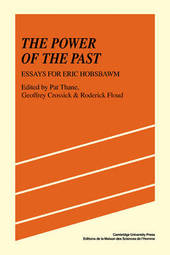
|
The Power of the Past: Essays for Eric Hobsbawm
Paperback / softback
Main Details
| Title |
The Power of the Past: Essays for Eric Hobsbawm
|
| Authors and Contributors |
Edited by Pat Thane
|
|
Edited by Geoffrey Crossick
|
|
Edited by Roderick Floud
|
| Physical Properties |
| Format:Paperback / softback | | Pages:320 | | Dimensions(mm): Height 229,Width 152 |
|
| Category/Genre | World history - c 1500 to c 1750 |
|---|
| ISBN/Barcode |
9780521275279
|
| Audience | | Tertiary Education (US: College) | |
|---|
| Illustrations |
Worked examples or Exercises
|
|
Publishing Details |
| Publisher |
Cambridge University Press
|
| Imprint |
Cambridge University Press
|
| Publication Date |
6 September 1984 |
| Publication Country |
United Kingdom
|
Description
Modern industrial societies are the creation of forced of change embedded in their pre-industrial and pre-capitalist past, forces which have shaped their economic structures, their politics of domination and resistance, their social ideas and relationships. In this book a distinguished group of historians focuses on this dialectal relationship between capitalism and its pre-capitalist heritage, revealing the ways in which older forms - whether they be social and economic structures and institutions, movements or ideologies, rituals or vocabulary - help to shape new, and are themselves reshaped in the process. The book thus develops a central theme in the writing of Eric Hobsbawm, to whom these essays are presented as a tribute on his retirement from Birkbeck College. An additional essay provides a major reappraisal of Hobsbawm's work. A number of different themes in modern European history are discussed in the context of the interrelationship of capitalism and the pre capitalist past. Several essays explore the history of the working class, its ideas and strategies of resistance, in France, Britain, Germany and Spain. Others discuss the place of landowners and bankers in the European ruling classes, and the development of central and eastern European societies. Their common concern is with the power of the past over patterns of change, and as such they are both a tribute to an outstanding British historian and a major contribution to the analysis of modern European history.
|